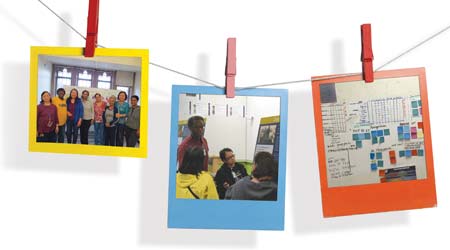
Benefits of leading your team with humility, respect and purpose
As leaders, we are aware of how morale and work culture can determine whether our team members are fulfilled with their jobs, or just going through the motions to collect a paycheck. And I believe that there are certain conditions that enable people to both truly care, and put their hearts into doing their best work.
During the course of my 40-year career, most of which was spent in my current position as director of University of Washington’s Building Services Department (BSD), I have been extremely fortunate to work with inspiring and hardworking people. I have also realized some effective leadership principles and processes that focus on improving the work and enabling the staff to feel passionate about being a part of a team.
Early in my career, I was considered fairly assertive, a problem solver and a multitasker. But I’ve evolved and matured into someone that puts people first and focuses on relating to others in a way that brings out their best. I am far more strategic about employing my assertiveness and authoritative approach because I now know that most situations don’t require that type of energy.
With this new mindset, I sought out guidance from an expert in helping departments transition to effective, continuous improvement. With that help, we have embedded four key systems into our departmental culture, while performing our daily work:
Strategy deployment: Aligning the organizational goals with front-line team goals and providing meaningful metrics so everyone knows if they are winning or losing daily.
Visual management: Using visual tools to track progress, establish goals and create ideas.
Daily kaizen: A team huddle where a brief conversation takes place among all members regarding pertinent issues about that day’s work.
Standard leader follow-up: A system to escalate issues up to leadership for appropriate follow-up, and a way for leaders to provide support and guidance.
Additionally, I had the opportunity to attend a SHINGO Leadership Conference and was introduced to three leadership principles. These include: lead with humility, respect every individual, and constancy of purpose.
To start this journey toward engagement, I knew that it needed to begin with our managers and supervisors. We had to redefine our roles and lead in a much different way if engagement was going to have a chance to take hold within our teams.
The leadership team understood that to really engage people and appeal to their hearts, we would need to support the four key systems by embodying these leadership principles. It takes time and consistency, but it is the experience the leaders create that will enable engagement to occur. Leaders step back and act as guides who set a supportive tone; this encourages risk and growth.
I believe that most leaders in the cleaning industry are compassionate, thoughtful and people-oriented. However, most cleaning operations function in a top-down command. Statements like, “Here is your schedule,” “This is the equipment you use,” and “This is how you perform the work,” do not allow for full participation and engagement in determining how work is done and how challenges will be conquered.
In most cases, this type of top-down leadership encourages cleaning workers to switch their brain to autopilot and discourages them from making suggestions. As a result, we all miss out on the opportunity to make improvements in how work is done, because team members are not involved in making change.
While we may intuitively know this and tap into the ideas of our team members on occasion, it’s vital to create a sustainable system that perpetuates the fostering of ideas and engagement consistently.
In order for teams to engage their hearts and minds, they will not only need to have purposeful goals that align, but also feel a sense of empowerment in affecting change and seeing real progress.
For example, is an idea steadily moving forward or is it delayed every week? Did the new equipment a team requested materialize yet, or is there merely a weak promise that someone will look into it?
People need to know their leaders take their ideas seriously and that their leaders can be counted on if and when they need help.
Encouraging And Motiving Staff

 The Down and Dirty on Cleaning in Virus Season
The Down and Dirty on Cleaning in Virus Season How Surfactant Use is Expanding in Commercial Cleaning
How Surfactant Use is Expanding in Commercial Cleaning